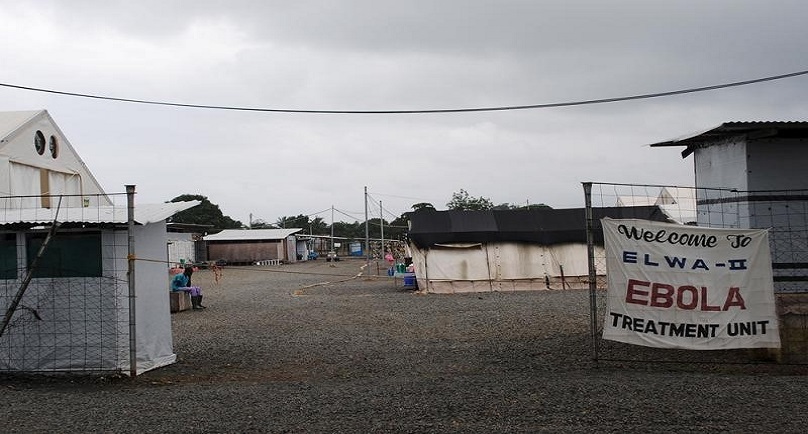Image: An Ebola virus treatment center is seen in Paynesville, Liberia, July 16, 2015. REUTERS/James Giahyue
By Emma Farge and James Harding Giahyue
DAKAR/MONROVIA (Reuters) – An outbreak of Ebola in Liberia months after the country was declared free of the virus could have stemmed from a survivor who became infectious again after her immune system was weakened by pregnancy, experts investigating the case said.
The theory being discussed by U.S. and Liberian researchers and the World Health Organization raises concerns about whether it will be possible to bring to an end the worst Ebola epidemic in history, with as many as 17,000 survivors in West Africa acting as a potential human reservoir of the virus.
Ebola can lie dormant and hide in parts of the body such as the eyes and testicles, and rare cases of the virus re-emerging have been reported before.
If proven, the Liberia case would be the first known example of such a patient transmitting the virus to others.
Health officials have been trying for weeks to explain why Ebola flared up in the Monrovia suburbs in November, nearly three months after the country was declared Ebola-free a second time and outside the typical incubation period for the virus.
The probe has focused on the family of Nathan Gbotoe, a 15-year-old boy who died of Ebola on Nov. 24, victim of an epidemic that has killed 11,300 people.
While Nathan was thought to have originated the “Duport Road Cluster” of three cases, the focus has since shifted to his mother: 33-year-old Ophelia, the sources said.
A main hypothesis for the new cases is Ophelia’s “recrudescence”, meaning a surge in virus replication from a dormant state, thought to be linked to a weakened immune system.
According to this scenario, Ophelia caught Ebola more than a year ago from her brother who died of a presumed Ebola infection in July 2014.
She is then believed to have recovered, but the virus flared up again this year while she was pregnant. Antibodies fighting the virus tend to drop towards delivery.
It is not known exactly how she might have transmitted the virus, which is found in bodily fluids, to her family. Despite her experiences, Ophelia is still alive.
Officials have since contained the Liberian outbreak and those in contact with the sick been released from quarantine. Neighboring Sierra Leone was declared Ebola-free in November and Guinea and Liberia are set to follow in December and January if all goes well.
Experts said that the theory means there can be no let up in the monitoring of survivors for months or even years to come.
“The affected countries want to say they are Ebola-free but they need help with continuing surveillance and health care monitoring,” said Jonathan Heeney, Professor of Comparative Pathology at Cambridge, who has written about human reservoirs of the virus.
“If you turn your back on this, you will see more of these cases.”
“BEWITCHED” FAMILY
Liberian officials have already ruled out the possibility that the virus was introduced from another country or from an animal, as happened in Guinea when the epidemic began in December 2013.
“It is the same strain of the virus that we’ve known here, that we have been dealing with in 2014,” said Tolbert Nyenswah, head of Liberia’s Ebola response, quoting initial findings.
The Liberia country head of the U.S. Centers for Disease Control, Desmond Williams, who is involved in the investigation, declined to comment, saying studies were ongoing.
The WHO said it assumed that the latest cases “arose as a result of a rare re-emergence of persistent virus from a survivor”, but did not elaborate.
The sources say that another possible explanation is a secret sexual relationship between a family member and another survivor, although interviews have so far yielded few leads.
This was thought to be the cause of a past flare-up of Ebola in Liberia in July.
In an indication of how hard it is to monitor survivors in West Africa, Ophelia’s husband denies that his family ever caught Ebola and says his son was bewitched. Doctors diagnosed him with the virus in November and he recovered.
“It’s all a blind lie,” Nathan Gbotoe Sr. told Reuters. He refuses to return to his Cow Field neighborhood for fear of coming under the same spell.
U.S. army scientists are trying to establish the origin of the new cases by reconstructing a genome from the family’s virus samples and comparing it with others mapped since the epidemic began.
CLASSIFYING SURVIVORS
The re-emerging virus in the brain of a Scottish nurse caused her to catch meningitis in October, doctors said. Officials in Sierra Leone have reported other unexplained deaths, which may be Ebola relapses.
Some doctors are therefore urging closer monitoring of survivors, including women, to prevent future flare-ups but warn against policies that might lead to their being ostracized.
So far, screening of survivors has mostly focused on men who can submit semen samples under voluntary programs to test whether the virus has lingered there. Less is known about the persistence of the virus in vaginal fluids.
Professor Heeney suggested that survivors could be divided into “carrier” or “cleared” categories, based partly on factors that may weaken the immune system and cause the virus to replicate to high levels, such as pregnancy, HIV and the use of immunosuppressive drugs.
Those deemed susceptible might be treated with antiviral medicines, he suggested.
Adam Kucharski, an expert on infectious disease epidemiology at the London School of Hygiene & Tropical Medicine, said he thought that transmission from recrudescent survivors, if proven possible, would be “extremely rare”.
He said stigmatizing survivors could make it harder to spot new cases since such people may not seek check-ups.
(Writing by Emma Farge; editing by Kate Kelland and Giles Elgood)
Copyright 2015 Thomson Reuters. Click for Restrictions.


